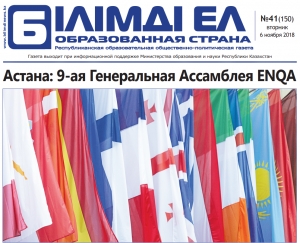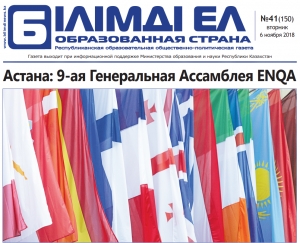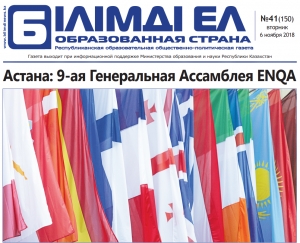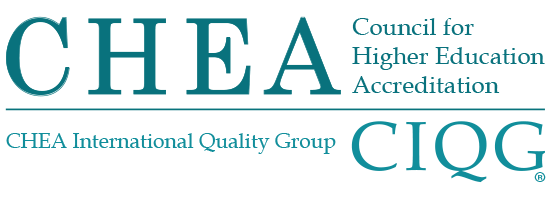Displaying items by tag: аккредитация
Programme accreditation
PROGRAMME (SPECIALIZED) ACCREDITATION
Programme (specialized) accreditation is an assessment of the quality of individual educational programmes implemented by an educational organization, designed to assess the level of compliance of the programme with the quality of the profession for which this programme prepares graduates. Accreditation of educational programmes consists of an official examination conducted by the accreditation agency in order to determine whether the training for these programmes meets the accepted standards and requirements.
The quality assurance system is evaluated in accordance with the IQAA quality standards by external experts who offer an objective view of the approaches and mechanisms for quality assurance and programme development. Accreditation is designed to play the role of a guarantor of the quality and reliability of the organization of education according to accredited educational programmes, to create trust on the part of applicants and their parents, and recognition by employers of the validity of the education received by graduates.
The standards for accreditation of higher education programmes are developed in accordance with the Law of the Republic of Kazakhstan "On Education", the European Standards and Guidelines for Quality Assurance of Higher Education (ESG) and the international practice on accreditation of higher education programmes.
The standards of accreditation of higher education programmes are based on generally recognized key concepts: the responsibility of higher education institutions for providing quality education, taking into account and protecting the interests of society, stakeholders and, first of all, students in obtaining quality educational services, compliance of higher education programmes with social and professional competencies, meeting the educational needs of individuals and society in obtaining a profession.
Standards of Programme (Specialized) Accreditation of Higher Education Organizations (2021)
The standards of specialized accreditation of postgraduate training of doctors in residency are developed in accordance with the Code "On the Health of the People and the Health System"; the Laws of the Republic of Kazakhstan "On Education", "On Technical Regulation"; regulatory documents of the Ministry of Health and Social Development of the Republic of Kazakhstan; International standards of the World Federation of Medical Education for Improving the Quality of Postgraduate Medical Education, European standards and guidelines, taking into account the national and regional needs and priorities of the health system of Kazakhstan.
Postgraduate medical education-residency, is the base of medical training, during which doctors gain experience after completing basic medical training. In accordance with the Law of the Republic of Kazakhstan "On Education" (No. 319-3 of 27.07.2007, Article 22), the development of a professional training programme of residency is a prerequisite for admission to clinical practice of citizens who have received higher medical education in clinical specialties.
INITIAL PROGRAMME ACCREDITATION
Initial programme accreditation (ex-ante) of higher education institutions – a procedure for assessing the quality of an educational programme (licensed by the state for educational activities under the programme) without graduates and employers for compliance with the declared status and standards of the accreditation body.
The initial accreditation status of an educational programme is granted when the proposed or developed programme demonstrates its potential to meet the IQAA accreditation standards developed on the basis of the ESG.
Initial institutional accreditation provides for all procedures for conducting an external audit in accordance with the standards and criteria for institutional accreditation of the educational organization/educational programme, with the exception of interviews with graduates and employers, and the implementation of the recommendations of the expert group after obtaining the status of initial accreditation.
Accreditation is carried out annually before the first graduation of students. The decision on the initial accreditation of educational programs is made:
- Accredit for 1 (one) year with an annual check of the educational program before the first graduation of students;
- Don't accredit.
Additional Info
-
Баннер

-
Banner_middle

-
Banner_small

Institutional accreditation
INSTITUTIONAL ACCREDITATION
Institutional accreditation is the process of assessing the quality level of an educational institution in accordance with the declared status. In the process of institutional accreditation, the quality of education and the scientific activities of the educational organization are evaluated.
The IQAA institutional accreditation standards are developed in accordance with the "Standards and Guidelines for Quality Assurance in the European Higher Education Area" (ESG) and are intended for the internal quality assurance system of higher education institutions.
The standards and criteria for institutional accreditation of higher education institutions are developed in accordance with the Law of the Republic of Kazakhstan "On Education", the European Standards and Guidelines for Quality Assurance of Higher Education (ESG), the requirements of the Bologna Process, international practice on institutional accreditation and audit of higher education.
The standards and criteria of institutional accreditation are intended for internal quality assurance of higher education institutions.
The standards and criteria for institutional accreditation are based on four key ESG principles:
1.Higher education institutions are fully responsible for the quality of the provision of educational services and ensuring their quality.
2.Quality assurance is consistent with the diversity of higher education systems, universities, educational programs, and students.
3.Quality assurance supports the development of a quality culture.
4.Quality assurance takes into account the needs and expectations of students, all other stakeholders, and society.
Standards for Institutional Accreditation of Higher Education Organizations (2021)
INITIAL INSTITUTIONAL ACCREDITATION
Initial institutional accreditation (ex-ante) of higher education institutions – the process of assessing the quality of the organization of higher education (licensed by the state for educational activities) without the release of students for compliance with the declared status and standards of the accreditation body.
The initial accreditation status of an educational organization is granted when the educational organization demonstrates its potential to meet the IQAA accreditation standards developed on the basis of the ESG.
Initial institutional accreditation provides for all procedures for conducting an external audit in accordance with the standards and criteria for institutional accreditation of the educational organization/educational program, with the exception of interviews with graduates, employers, and students and the implementation of the recommendations of the expert group after obtaining the status of initial accreditation.
Additional Info
-
Баннер

-
Banner_middle

-
Banner_small

ADDITIONAL EDUCATION
ADDITIONAL EDUCATION
Additional professional education is aimed at meeting the educational needs throughout life in order to obtain an additional amount of knowledge and skills in accordance with the ongoing socio-economic changes in society.
Additional adult education is provided by the educational organizations, as well as the legal entities that have structural divisions that implement additional educational programs.
In the process of institutional accreditation, the quality of education and the scientific activity of the educational institution is evaluated. The IQAA standards and criteria for institutional accreditation are developed in accordance with the Standards and Guidelines for Quality Assurance in the European Higher Education Area (ESG) and are intended for the internal quality assurance of the educational institution.
Through accreditation, the educational institution has the opportunity to receive an independent expert assessment and measures to further improve its activities.
The accreditation procedure of the educational program is carried out by independent international and national experts in accordance with the Standards and criteria of the IQAA program accreditation and covers all aspects of the educational program.
After receiving accreditation, the Agency annually conducts post-accreditation monitoring (PAM). Educational institutions must submit an annual report to IQAA on the changes and achievements that have occurred during the year in order to carry out continuous monitoring of activities and periodic evaluation of educational programs. Periodically and selectively, monitoring is carried out with a visit directly to the educational organization. All procedures for post-accreditation monitoring are prescribed in the Regulations on Post-accreditation Monitoring.
Thus, by promoting high quality in education, the Agency provides an opportunity for educational organizations to eliminate the identified inconsistencies and improve their activities.
Additional Info
-
Баннер

-
Banner_middle

-
Banner_small

PRESCHOOL AND SECONDARY EDUCATION
PRESCHOOL AND SECONDARY EDUCATION ACCREDITATION
Accreditation of educational organizations is a procedure of recognition by the accreditation body of conformity of educational services to the established standards (regulations) of accreditation in order to provide objective information on their quality and to confirm the availability of effective mechanisms for its improvement (subparagraph 16 of Article 1 of the Law of the Republic of Kazakhstan ‘On Education’).
1. Providing a mechanism for ensuring the quality and effectiveness of the educational process in preschool and secondary education organizations.
2. Stimulating the activities of the organization in the direction of improving the quality of preschool and secondary education and upbringing.
3. Providing a real opportunity for parents of preschool and secondary education children to choose an individual educational route for their child from a wide range of high-quality educational services.
- Procedure for accreditation of preschool and secondary education organizations is carried out voluntarily;
- Focus on improving the quality of preschool education and upbringing;
- Integrity and transparency: internal and external evaluations are conducted fairly and transparently, and information is made available to all participants in the ongoing accreditation process;
- Objectivity and independence: internal and external evaluation is conducted objectively, independently of third parties;
- Responsibility of educational organizations: the primary responsibility for the quality of education and upbringing is assigned to the preschool and secondary education organizations;
- Quality assurance takes into account the needs of children, all other stakeholders, and society as a whole.
Additional Info
-
Баннер

-
Banner_middle

-
Banner_small

A newspaper "Bilimdi el-Educated country" devoted first pages of a regular issue to publications on international level events organized by IQAA
In the regular issue No. 41 (150) of November 6, 2018 of the Republican educational socio-political newspaper "Bilimdi el-Educated country" (Білімді ел – Образованная страна) the first pages are devoted to publications on the results of events organized in Astana by the Independent Agency for Quality Assurance in Education (IQAA):
• "Astana: the 9th General Assembly of ENQA" - Welcome letter from the Chairman of Senate of the Parliament of Kazakhstan Kassym-Zhomart Tokayev to participants of the 9th General Assembly of ENQA, held October 18-19, 2018 in Astana;
• "Quality Assurance in Higher Education" - a detailed material on the progress and results of the 9th General Assembly of ENQA;
• "Study of international experience in conducting accreditation procedures" - a detailed presentation of the progress and results of the International Conference on Quality Assurance in Higher Education "Training of an external review group and preparing reports" held on October 15, 2018 in Astana.
«Білімді ел - Образованная страна» газетінің кезекті басылымынын алғашқы беттері БСҚА ұйымдастырған халықаралық деңгейдегі іс-шаралар туралы жарияланымдарға арналған.
2018 жылғы 6 қарашадағы №41 (150) кезекті нөмерінде «Білімді ел – Образованная страна» республикалық қоғамдық-саяси газетінің алғашқы беттері Астана қаласында БСҚА ұйымдастырған іс-шаралар нәтижелері туралы жарияланымдарға арналған:
• «Астана: ENQA 9-шы Бас Ассамблеясы» - ҚР Парламент Сенатының Төрағасы Қасым-Жомарт Тоқаевтың Астана қ. 2018 жылы 18-19 қазанда өткізілген ENQA 9-шы Бас Ассамблеясының қатысушыларына сәлемхаты;
• «Жоғары білім беру саласында сапасын қамтамасыздандыру» - ENQA 9-шы Бас Ассамблеясының жұмысы мен нәтижесі туралы толық мәлімет;
• «Аккредитация рәсімін жүргізудегі халықаралық тәжірибені зерделеу» - 2018 жылдың 15 қазанында өткен «Сыртқы сараптамалық топты оқыту және есептер дайындау» атты жоғары білім беру саласында сапаны қамтамасыздандыру бойынша Халықаралық конференцияның жұмысы мен нәтижелері туралы егжей-тегжейлі баяндау.
Газета «Білімді ел – Образованная страна» посвятила первые полосы очередного выпуска публикациям о мероприятиях международного уровня, организованных НАОКО.
В очередном номере №41 (150) от 6 ноября 2018 года Республиканской образовательной общественно-политической газеты «Білімді ел – Образованная страна» первые полосы посвящены публикациям об итогах мероприятий, организованных в г. Астане Независимым агентством по обеспечению качества в образовании:
• «Астана: 9-ая Генеральная Ассамблея ENQA» - Приветственное письмо Председателя Сената Парламента РК Касым-Жомарта Токаева в адрес участников 9-ой Генеральной Ассамблеи ENQA, проведенной 18-19 октября 2018 года в г. Астана;
• «Обеспечение качества в высшем образовании» - подробный материал о ходе и результатах работы 9-ой Генеральной Ассамблеи ENQA;
• «Изучение международного опыта проведения процедур аккредитации» - детальное изложение хода работы и итогов Международной конференции по обеспечению качества в высшем образовании «Обучение внешней экспертной группы и подготовка отчетов», проведенной 15 октября 2018 года в г. Астана.
Additional Info
- SeoTitle Газета «Білімді ел – Образованная страна» посвятила первые полосы мероприятиям международного уровня, организованных НАОКО




 Ministry of Science and Higher Education of the Republic of Kazakhstan
Ministry of Science and Higher Education of the Republic of Kazakhstan 


 Ministry of Education and Science of the Kyrgyz Republic
Ministry of Education and Science of the Kyrgyz Republic




